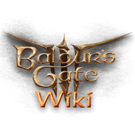More actions
Baldur's Gate 3 is a turn-based adventure with a wide variety of gameplay mechanics.
Turns and rounds
A turn is the most basic unit of time in Baldur's Gate 3 gameplay. During combat, each creature takes a turn, usually in sequential order. When all creatures have taken their turns, a round has passed.
When two or more allied creatures are in close proximity to each other and would have otherwise taken their turn immediately after each other, they can usually take their turns at the same time.
Turn order
The order in which creatures take their turn (the turn order) is decided by rolling for initiative, which is a 1d4 + Dex mod roll.
If creatures who fight on the same side are adjacent to each other in the turn order they share their turn order position and can act interchangeably. For this matter, creatures who are summoned by the player but not controlled by the player, such as the ghouls from the Necromancy of Thay, are not considered to be on the player's side. The maximum group size for a shared turn order position is 10 creatures.
If a creature that is attacked is unaware of their attackers at the start of combat, the first round of combat is declared a surprise round, during which only the attackers may take actions.
Turn-based mode
While turns are primarily featured in combat, a turn-based mode is also available outside of combat, and automatically turns on in certain scenarios, such as when certain traps are activated.
Action economy
Most creatures are able to take one action, one bonus action and one reaction per turn, but some equipment and class features allow a creature to take more actions than this.
Actions, bonus actions and reactions are also represented as resources that are replenished at the start of a creature's turn. For example, when a creature takes an action, their action resource is used.
Resources
- Action: The primary resource, used for taking actions, such as Attack, Dash, Hide, Throw, Spellcasting etc.
- Bonus action: A secondary resource a character can use during a turn to take bonus actions, such as Jump.
- Some traits or class features allow a creature to take specific actions as bonus actions.
- Reaction: A secondary resource a character can use during a combat round. It primarily allows a creature to take reactions outside their own turn - such as Opportunity Attacks.
Creatures
All characters, animals and monsters are creatures. Every creature has a race and a creature type, and may have racial traits.
Classes
All Humanoid creatures, including the player character and all party members, has a class. Player characters and all companions also have a background, and can use equipment. Having levels in a class allows access to class features, which are the features that set classes apart from each other.
Classes may also grant access to spells and feats.
Spellcasting
While all classes are capable of casting spels, some classes are proficient in spellcasting, and automatically learn spells. These classes may cast these learned spells using spell slots.
Spell slots are a replenishable resource, and are usually replenished on a long rest. Warlocks are able replenish spell slots on short rests, and wizards and Circle of the Land druids have class features that allow a limited amount of spell slots to replenished without a rest.
Some classes can cast any spell they know at any given time (such as bards, sorcerers, warlocks), as long as they have available spell slots, whereas others must prepare spells – either from a list of spells known (wizards), or from a list of class spells (clerics, druids, paladins, rangers).
Stats
All creatures have hit points that determine how much damage it can take, and abilities which are used in calculation of dice rolls.
Other important stats include Armour Class, proficiency bonus and resistances.
Conditions
Conditions are the lingering effects of certain spells, class features, equipment or environments. They usually have a set duration, but some may last until the party has taken a long rest.
Equipment
Weapons
Having a weapon equipped grants a character access to special actions only usable while wielding that weapon. These are usually special attacks that can do bonus damage, hit multiple targets, debilitate foes, or move the character
